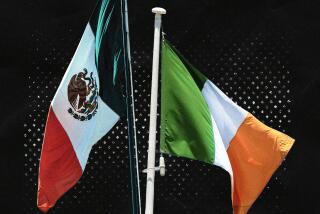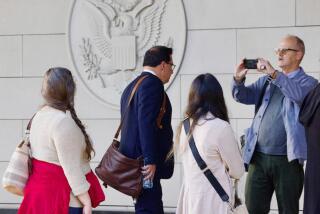Blase Bonpane, USC football player turned priest turned peace activist, dies at 89
In early 1968, at the height of the Vietnam War, newspapers across the country ran a sensational story: A group of Roman Catholic nuns and priests were trying to foment a Communist revolution in Guatemala.
The Guatemalan government had accused priests and nuns associated with the Maryknoll order of planning to smuggle in arms to help rebels. Superiors ordered the missionaries back to the United States, and told them not to speak to the press about the affair.
But 38-year-old Blase Bonpane couldn’t stay silent. On Feb. 4, the Washington Post ran an essay by the Angeleno that blasted the American government for supporting “an oligarchy of 2 per cent of the Guatemalan people who possess 80 percent of the land and resultant power.”
“I am a patriot,” wrote the former Marine. “It sickens me to see my country on the wrong side in Guatemala. I think the United States is the greatest country in the world, and I don’t want to see it on a self-destruction course.”
Soon after, Maryknoll expelled Bonpane from its ranks. He returned to Los Angeles, and launched a lifetime of antiwar activism that saw him turn into a stateside Jeremiah on Central America, someone whose warnings about the blowback that American influence in the region would create resonates to the present.
Bonpane died on Monday. He was 89.
“He was the cornerstone of our family, and we will miss him and honor him,” the Bonpane family said in a statement. “But we will also be guided by the word he shared with us during a particularly painful emergency room moment: ‘Exultet,’ which is Latin for ‘let us rejoice.’”
The son of Italian immigrants seemed an unlikely candidate to live a life of social justice. Tall and burly, his father was a Los Angeles Superior Court judge. Bonpane attended USC and played on the football team. He earned two bachelor degrees and a pair of master’s degrees as well. Then-Vice President Richard Nixon attended his ordination in 1958.
Among the young priest’s earliest assignments: the college circuit, where Bonpane lectured to undergrads about “the fundamentals of Christian life,” according to an early professional biography.
His path changed forever in 1967 when Bonpane went to Guatemala, as he’d put it later, to help “start a revolution.” By then, the Maryknolls were one of the major American proponents of liberation theology, which sought to merge the New Testament with Marxist theory to help the destitute across the world.
In Guatemala, Bonpane and his fellow priests vaccinated children and helped organize the poor in cities and the countryside. “I do not intend to become accustomed to the poverty and destitution of these poor people,” he wrote in a diary at the time. “I do intend to do whatever I can to change these evils.”
The efforts to uplift Guatemalans made Bonpane a target; shortly before the Maryknolls recalled him, someone firebombed his office.
His first-hand experience in Guatemala and blunt language made Bonpane a go-to source for the American media during the 1970s and 1980s, as Central America plunged into civil war. But more than just stay home and rail, Bonpane began to organize; he and his wife, Theresa (herself a former Maryknoll nun), created Office of the Americas in 1983.
The nonprofit organized trips to Central America so visitors could witness first-hand the devastation wrought by conflicts in the region and then spread the word across the English-speaking world. The Bonpanes also brought Central American notables like Nicaraguan President Daniel Ortega, Nobel laureate Rigoberta Menchú and Salvadoran activist Ruben Zamora to the United States to lecture on how U.S. foreign policy affected their countries, and how American-trained military forces killed their countrymen by the hundreds of thousands.
- The good works made Bonpane a regular at progressive events across Southern California, and a favorite of the Hollywood set.
“He was one of my heroes,” longtime friend Martin Sheen told The Times on Tuesday. “He is irreplaceable.”
All that activism, however, caught the eye of the FBI and CIA. Bonpane’s file, held in the UCLA library’s special collection, numbers hundreds of pages.
In his spare time, Bonpane (who eventually earned a doctorate in Latin American studies from UC Irvine) taught political science at colleges across Southern California, wrote multiple books and hosted “World Focus,” a radio show on KPFK-FM 90.7, for 50 years until he retired last May.
He is irreplaceable.
— Martin Sheen, actor
“He inspired us to speak truth to power and to lift up those who are dedicated to non-violent revolution,” KPFK general manager Anyel Zuberi Fields said in a statement. “We will carry on his legacy.”
Bonpane’s most lasting media moment, however, happened in 1983, when he appeared on conservative commentator Wally George’s television show. Bonpane thought they were going to debate the American invasion of Grenada. Once the activist realized the invite was only so he could get lampooned, Bonpane decided to offer his antiwar message directly to the audience while ignoring George.
The host got up and angrily shook his guest by the shoulders; Bonpane flipped George’s desk over in response and walked out of the studio. The clip went national, and remains a mainstay of Southern California media lore. Bonpane remained forever unapologetic about the incident, calling it “a symbolic act of moral outrage.”
Bonpane is survived by his wife of 49 years, Theresa; a daughter, Colleen; a son, Blase Martin; and six grandchildren. A ceremony will be held in his memory next month at Santa Monica lifeguard Station 26, one of his favorite swimming spots.
Even though the Maryknolls expelled Bonpane, he never renounced his clerical days despite titling his autobiography “Imagine No Religion.”
“You can be in all kinds of bad standing,” Bonpane once told a reporter. “But when people say, ‘Did you use to be a priest?’ I say, ‘No, I am a priest.’”
Twitter: @GustavoArellano
More to Read
Start your day right
Sign up for Essential California for news, features and recommendations from the L.A. Times and beyond in your inbox six days a week.
You may occasionally receive promotional content from the Los Angeles Times.







